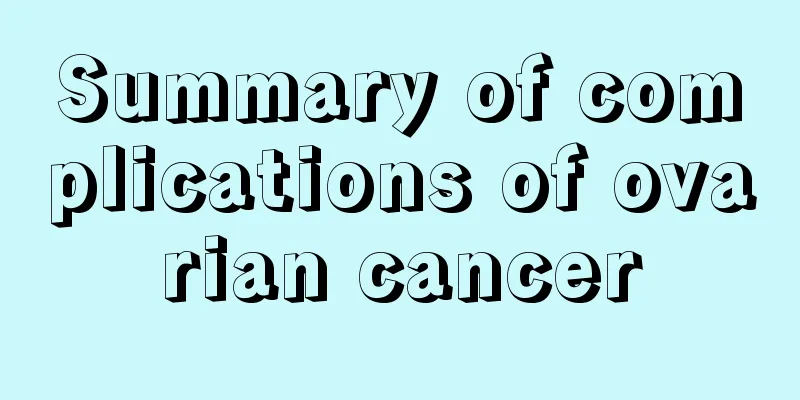Enlargement of the pancreatic tail

|
Enlargement of the tail of the pancreas is common after a large meal, and this condition is often considered to be pancreatitis. Enlargement of the pancreatic tail is often a related manifestation of hospital CT scans. This manifestation means that there is inflammation in the surrounding area. At this time, it is necessary to listen to the doctor's advice and seek treatment based on the relevant symptoms. You may not know much about pancreatitis. Here we will introduce some relevant knowledge about pancreatitis in detail. 1. What is pancreatitis? Pancreatitis is an inflammation of the pancreas due to obstruction of the pancreatic duct, increased pressure in the duct and poor blood circulation, but its essence is that pathogenic factors cause the pancreatic juice to overflow and come into contact with the pancreatic parenchyma, activating the digestive enzymes in the pancreatic juice, causing pancreatic autodigestion and pathological changes such as edema, bleeding and necrosis. Currently, most people believe that trypsin does not act directly on the pancreatic parenchyma to cause autodigestion, but rather it activates other enzymes that lead to local and systemic changes in acute pancreatitis. Common causes of acute pancreatitis include gallstones, biliary ascariasis, overeating, and excessive drinking. Pancreatitis can be acute or chronic. The most common case is acute pancreatitis, the symptoms of which are sudden and persistent abdominal pain that may spread to the shoulders and lower back. Often accompanied by nausea, vomiting, fever, etc. Physical examination may reveal obvious tenderness and muscle tension in the left upper abdomen, weakened or disappeared abdominal distension and bowel sounds, etc. Blood and urine amylase levels are often elevated. Abdominal puncture to measure amylase, abdominal X-ray examination, B-ultrasound and CT, etc., all have diagnostic or differential diagnostic value. The treatment of pancreatitis is based on the condition of the disease. For mild cases, non-surgical treatment is generally used, while for severe cases or those that are ineffective with non-surgical treatment, surgical treatment should be used. For prevention, you should actively treat cholelithiasis and biliary ascariasis, and avoid excessive drinking and overeating. 2. Precautions for patients with pancreatitis 1. In case of acute attack, go to the hospital immediately and receive further treatment according to acute pancreatitis. Even if there is no acute attack, go to the hospital for regular check-ups. 2. People with diabetes should control their diet according to the doctor's orders and use hypoglycemic drugs under the guidance of a physician. 3. People with diarrhea should adopt a high-sugar, high-protein, low-fat diet. 4. You must abstain from alcohol and smoking. Avoid overeating or eating too much to prevent further damage to pancreatic function. Pay attention to details in your daily life when you have pancreatitis, and be sure to put it into practice once you understand it. At the same time, using pancreatic soup for treatment is the key. |
<<: How to drink green tea powder
>>: Which kind of matcha powder is good
Recommend
Medicine and food nourish the kidney, what are the Chinese patent medicines for nourishing the kidney
As we all know, kidney deficiency is a common dis...
What are the methods for physical examination of scoliosis
If you feel that your spine has scoliosis in your...
Is it good to eat longan at night
Many women are very fond of longan and eat a few ...
Introduction to nursing methods after radical renal surgery for elderly patients with nephrotic carcinoma
Radical nephrectomy is a treatment method for kid...
What are the benefits of cupping on the soles of the feet
The soles of the feet are a relatively sensitive ...
The most common cause of cardiac arrest
The heart is the most important organ and the mos...
A one-month-old baby has green poop
If a baby who has just turned one month old has g...
What to do if there are vertical lines on eyebrows
As we age, especially girls, we will find that ou...
Can neurasthenia and insomnia heal itself?
There are many reasons for insomnia, such as stre...
What can I eat after giving birth to enlarge my breasts?
For women, it is such a happy thing to have a pai...
What are the effects of sulfur ointment
Sulfur has been used in various industries since ...
What to do when you have a toothache? Simple and easy, 8 tips to help you get rid of toothache
As the saying goes, "A toothache is not a di...
Introduction to massage methods for prostate cancer
Prostate cancer is one of the most serious malign...
What to do if red spots appear all over the body and it itches
The problem of itching in the human body is cause...
Is dysmenorrhea a disease?
Some female friends experience dysmenorrhea durin...









